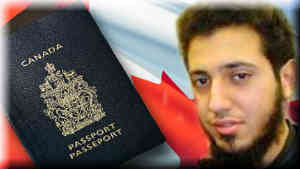On May 29, 2015, the Strengthening Canadian Citizenship Act came into force. This legislation allows for citizenship to be stripped from Canadians for, among other things, terrorist activity.
On Friday, the federal government announced a letter was sent to Zakaria Amara advising him his Canadian citizenship has been revoked. Amara, who is serving a life sentence but will be eligible for parole next year, is the first person to have his citizenship taken away for terrorist activity.
Defence Minister Jason Kenney described the move as “a fitting first example” of the law.
Under the Strengthening Canadian Citizenship Act, the Minister of Citizenship and Immigration has the power to revoke the Canadian citizenship of a person who is convicted of terrorism offences, high treason, treason or other espionage offences. In addition, the Federal Court of Canada has the jurisdiction to revoke the citizenship of a person who is a member of the armed forces of a country or an organized terrorist group that is engaged in an armed conflict against Canada or Canada’s military.
Although persons born in Canada can lose their citizenship, these procedures are limited to persons holding dual citizenship. It is against international law to revoke the citizenship of a person if by so doing it will leave that person stateless. From a practical point of view it would be pointless to revoke the citizenship a person who is only a citizen of Canada because there is no other country they can be removed to. Amara is also a citizen of Jordan.
Amara was a ringleader in the “Toronto 18” terror plot that was broken up in June 2006. In October 2009, he pleaded guilty to two terrorism related charges. The following year he was sentenced to the maximum of life imprisonment.
Amara, who was 20 years old at the time these offences were committed had planned to rent trucks, fill them with explosives and set these explosives off by remote control. Among the targets to be chosen were the Toronto headquarters of Canada’s intelligence agency and the Toronto Stock Exchange. Other targets discussed during the plot included a Canadian military base, the Parliament buildings and the Sears Tower in Chicago.
The plot was able to be infiltrated by the authorities and what was purported to be three tonnes of ammonium nitrate was delivered to Amara by a police agent. This was three times the amount Timothy McVeigh used to blow up the Alfred P. Murrah building in Oklahoma City in April 1995.
Amara was overheard on wiretaps saying he knew he was risking a lengthy jail term but it would be worth it if he tried his best. His aim was to cause as much panic and as many civilian deaths as he could.
This was all planned with a view of getting Canada to withdraw their troops from Afghanistan. It was to be payback to the infidel armies who were at war with Muslims.
Of the revocation of citizenship, Kenney told the Canadian Press, “If somebody is found guilty of violent disloyalty to Canada, in this case the murder of hundreds or potentially thousands of Canadians for ideological reasons, that they are in so doing, forfeiting their Canadian citizenship. They are renouncing through their own actions, through their own violent volition, they are renouncing their Canadian citizenship.”
It is hardly coincidental the first application of the revocation of citizenship for terrorist offences comes as the October 19 federal election approaches. Nor is it a coincidence Amara was chosen as the first Canadian citizen to have his citizenship revoked for terrorist activity. Both the Liberal Party of Canada and the New Democratic Party, the only opposition parties that have a chance to form a government, intend to repeal or drastically alter the Strengthening Canadian Citizenship Act if they come to power. Besides the economy, terrorism and the safety of Canada is a major election issue.
Liberal leader Justin Trudeau opposes the legislation because it creates two-tiered citizenship. He said it “devalues Canadian citizenship by creating two classes of citizenship.”
In Trudeau’s mind, or what there is of it, Zakaria Amara, who spent a great deal of time, effort and money in an attempt to kill as many innocent Canadians as possible, is just as worthy to be a Canadian as any other citizen is.
Trudeau also said, as he does to other efforts to protect Canadians that Harper and the Conservatives are just trying to divide people. The Boy Blunder never does tell us why it is wrong to divide Islamic terrorists from the rest of Canadians.
Similarly the NDP opposes the law because it creates two classes of citizenship. This is hardly surprising for the party that has described the fight against ISIS as “not our war.”
There are legal challenges to the bill including a challenge that citizenship should not be able to be revoked by the minister rather than a court and the fact that persons born in Canada who might not even know they have dual citizenship may end up in a country they have no real connection to.
This is one of those issues that, like the requirement to ban the wearing of a niqab during citizenship ceremonies, has a lot of appeal to ordinary people.
Although Amara is the first person to have his citizenship revoked due to conviction for terrorism, the government promises there will be more. The Conservatives of course have to be re-elected.










